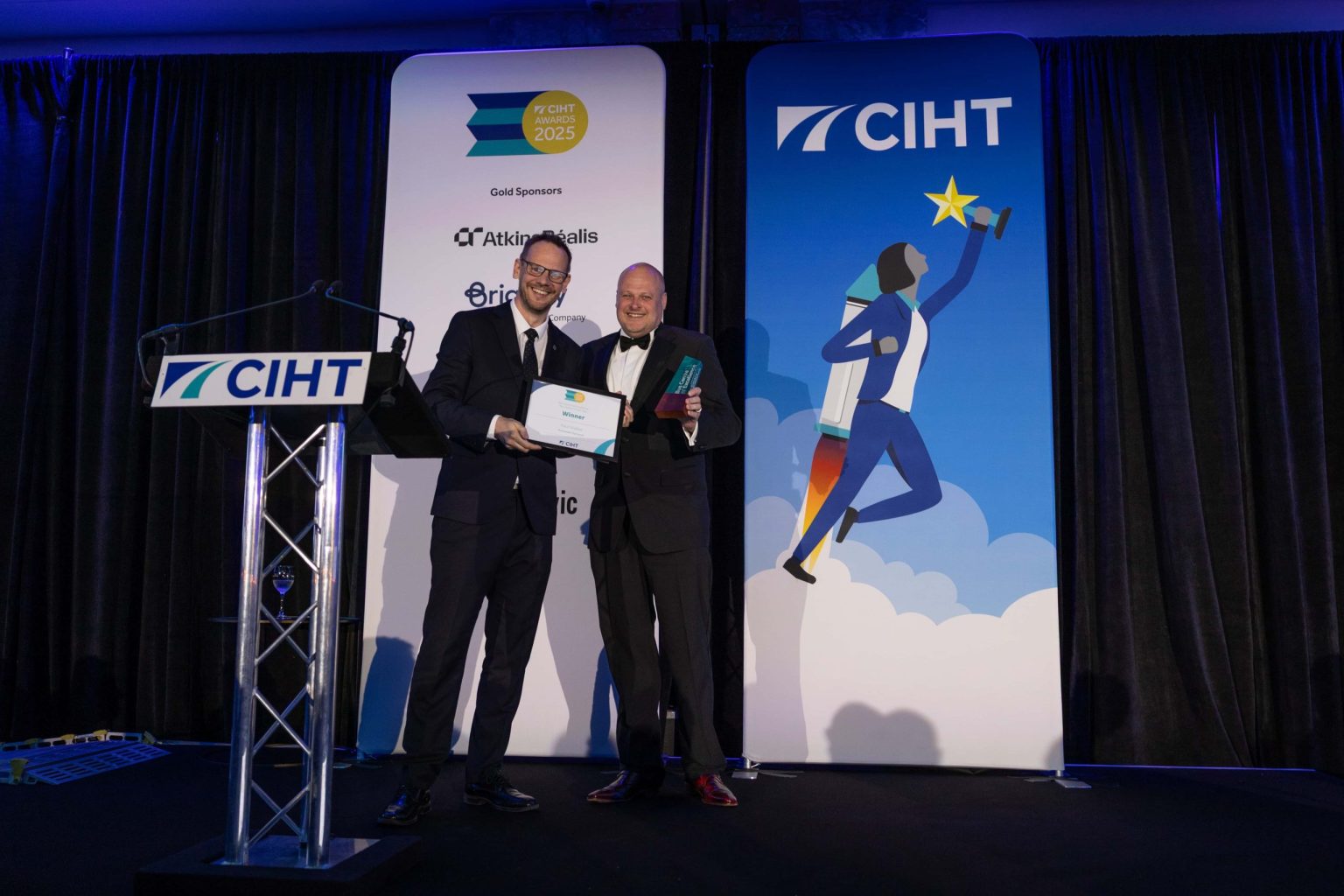On 4 June, Paul Walker, Head of Passenger Transport at Portsmouth City Council, won the Person of the Year accolade at the Bus Centre of Excellence Awards
The Bus Centre of Excellence aims to share expertise and grow knowledge across the public and private sectors of bus-centred activity. Paul found out he had been nominated for an award in May. The category ‘acknowledges an individual’s exceptional contribution within the bus transportation sector’. For Paul, it recognised work undertaken at Go South Coast and at Southampton (winner of Transport City of the Year 2013 at the National Transport Awards) but it primarily shines a light on his achievements within Portsmouth, wherein he oversaw notable increases in bus patronage and improved partnership work with bus operators and suppliers.
Alongside Leicester, its approach, undertaken through an Enhanced Partnership model, has been lauded widely for those gains: Over 40% passenger growth under the existing arrangement, strong delivery of bus priority in the city and significant time savings as a result, and the consequent enabling of policy aims such as improved air quality.
Those gains come at a crucial time. With many regions now exploring options such as franchising as a route to improving services, Paul is firm in his commitment to the Enhanced Partnership model, and is already looking at ways it could evolve. He is also passionate about ensuring such models are seen when they demonstrate truth in the oft-heard axiom, that when it comes to bus reform, no “one-size-fits-all solution” will work.

History of the Enhanced Partnership
Portsmouth’s Bus Service Improvement Plan (BSIP) established the Enhanced Partnership in late 2021. Every year the BSIP is updated with a programme agreed through an Enhanced Partnership board, and the city’s bus operators are included in that process. Any changes over £5 million need approval from the Department for Transport (DfT). The approach is now less “hands-on” than it was at the very start, but DfT continues to watch closely to ensure Portsmouth delivers against what it promises — even to the point where it attends the Christmas parties.
But DfT need not worry, it seems. A strong relationship between all the authorities in Hampshire, the Solent and the Isle of Wight has long existed through Solent Transport, a collective formed in 2008, of parties interested in delivering network and infrastructure improvements. Contributing to those improvements have been the Local Transport Fund, the Better Bus Area Fund, the Transforming Cities Fund and Bus Back Better scheme.
This all forms a “vision” within Hampshire of mass rapid transit networks, elements of which have been delivered through those different projects, according to Paul. The BSIP is simply the latest addition to an overall pot of successful delivery. “That open, honest relationship, and a track record of delivery between the bus operators and the local authorities, establishes institutional trust,” he adds. “That way, if people move on, or things change, the momentum is still there. There is a history and a culture of partnership working and delivery.”
Paul was specifically recruited to manage the BSIP at Portsmouth City Council in 2023. Before then, he had spent over six years at Go South Coast as Head of Strategic Development under the leadership of the late Andrew Wickham. He had joined the operator after 20 years in local government across Hampshire and Wiltshire, which included the post of Head of Transport and Highways at Southampton City Council.
For Paul, getting bus delivery right has its roots in a childhood spent in Coventry, where plans to revise Green Belt land in the 1980s nurtured an early interest in urban development. “It was then that I realised that improving access to education and employment was not just about cars, but about access to buses and services,” he says. “I’ve always liked buses, and they’re an important policy tool in trying to improve the environment and reduce reliance on cars. Many people, myself included, think it would be great not to have to rely on the car so much.”

An alternative that works
In 2023-2024, total managed government expenditure fell just short of 50% of GDP. Transport accounts for just 5% of that treasury spend. Given movement on franchising discussions, how long bus capital expenditure sits on the spreadsheets of operators is an unknown across many regions. Growing are discussions as to whether local authorities under such arrangements are prepared to issue UK gilts, or be financed through debts on government spreadsheets, when so many other priorities, such as social care, exist.
Amid the momentum of franchising, Paul wants to use his award win, and his work in Portsmouth, to make it clear that a workable alternative exists, and can achieve excellent results at reduced risk. “There’s a lot of noise about franchising right now and I think the industry needs to take a step back and ask what sort of franchising it is that we are looking at,” he says. “The concern I have is that the market in Portsmouth is not broken. Nor is it in Leicester. Why change something that is delivering passenger results?”
Portsmouth had a vision through its BSIP set out through four key themes: Make bus travel value for money, improve reliability and journey time, increase patronage, and improve passenger satisfaction.
Between 2022-2025, the City Council was allocated over £48 million. Through a “genuine approach to partnership” the arrangement has delivered one million passengers per month, with the best post-COVID performance of any city, according to 2024 DfT statistics. In the last two years, it has seen 41% growth in passengers and good customer service stats from Transport Focus both for Stagecoach and First Bus in the city. It has a fleet whose average age is six-and-a-half years, approximately 24% of which is now electric. Real time information is at 90% of the roadside. The standard of service is good, the standard of roadside is good, and Paul says excellent relationships have been established with Externiture (a supplier delivering bus stop flags and shelters) and Bauer Clear Channel, which is replacing and refurbishing bus shelters through a partnership project.
These achievements all come down to a belief in true partnership; institutional trust defined by honest conversations. A data-led approach is taken with services only funded where they have a commercial tail. The council funds services until March 2026 but operators take on commercial risk until the end of December 2026, meaning an approach of co-development of services. That gives routes the best possibility of being operated commercially at the end of the funding period. For enhanced services, risk is underwritten for operators following an assumption of patronage under certain conditions, meaning operators are not out of pocket while awaiting for services to “wash their face” commercially.

Evolution of Enhanced Partnership
Despite those gains, Paul anticipates that, similar to Leicester, a plateau is likely in the next year or so. So how will the approach evolve?
“We fill the gap with a new approach to Enhanced Partnership, which ties in together the existing arrangements but has a more focused approach on risk and reward; KPIs; an assured network. Something based on a control period similar to the railways, so you can give operators comme
rcial confidence to invest in the network, and prioritisation of buses over a period of time. That’s the next level we want to take the Enhanced Partnership to; and that is what we think would be a good way to evolve going forward.”
That new approach has been mooted during a piece of consultancy work and could form what for now is being called a “Quality Growth Network”. That is at the discovery phase for now. But whatever happens, Paul is clear that, contrary to some opinions, it proves the bus market is not broken* and that there is potential to invest and a market to develop.
The Quality Growth Network approach represents a missing middle track between the base form of Enhanced Partnership, where ambiguity exists over what “good” looks like in terms of KPIs, and the franchising approach driven by an ideological or political will.
Doing so would deliver on “explicit duties to deliver those key outcomes” and develop the network hand in glove, looking at risk and revenue share. “Because what you want to do is not transfer the whole of the risk to the local authority,” Paul says. “That won’t deliver the dynamic growth. We think we can deliver the growth outcomes of franchising at about £10 million a year less than the Manchester model, with limited advisory costs and setup costs. We think we can deliver that in around 18 months, two or three times shorter than it would take going through a franchise model. That would have integrated tariffs, an integrated bus network, enhanced vehicle investment and bus priority.”
After all, franchising in itself does not enable the bus to deliver on policy aims around congestion or air pollution. Liverpool and Manchester have been slower to put in bus priority compared to Leicester and Portsmouth; in Manchester’s case, that could well be due in part due to roads and transport being managed by local councils, while buses are co-ordinated via Transport for Greater Manchester under the Greater Manchester Combined Authority. Which body in that scenario takes responsibility for journey time savings?
Transport Minister Simon Lightwood’s words come to mind. He has been vocal on local approach [routeone/News/October 2024].
“It helps that local areas have been allowed to develop a combined authority they want to see, and the benefits of that work is the opportunity to build something that can deliver for bus in a unique geographical area,” Paul says. There is no suggestion anywhere that the Manchester or Liverpool approach is wrong; but a city like Portsmouth would certainly be low down in the queue for funding if it followed the same route. After all, there is the West Midlands, and West Yorkshire to consider first. “So we need to find the outcomes we want but at a lower cost,” Paul says. “Which leaves a better Enhanced Partnership approach.”
If a local authority wanted to replicate the approach taken in Portsmouth, Paul recommends pragmatism first and foremost. “Look at what works and doesn’t. Concentrate on outcomes and the hours available to deliver them, and don’t obsess over delivery mechanisms. Understand how the network works — local authority officers should be in bus depots, seeing how vehicles run out. And concentrate on building trust — contracts and agreements are only that, agreements. Working closely, relationship building, is what delivers the real outcomes — honesty and openness. Without that trust, nothing will get done.”

Tribute to Andrew Wickham
Paul says he learned of his award nomination only a week after the passing of his former boss at Go South Coast Andrew Wickham. Paul first met Andrew in 2003, when Go-Ahead bought the Wilts and Dorset bus company.
“Andrew was a friend, mentor and former boss. We were letting the Salisbury park-and-ride contract. I was at Salisbury District Council and he came to reassure us that the contract would be honoured. That was the start of a 22-year friendship.
“Andrew taught me a lot of what partnership really means. The award means a lot on that basis, and I’d like to think Andrew would be proud of that; it recognises the work we do across Portsmouth and the wider area and that we’re moving in the right direction.”
*In November 2023, a report published by the Subsidy Advice Unit on behalf of the West Midlands Combined Authority declared only around 50% of pre-COVID-19 bus service distance (total miles travelled by buses) in the West Midlands bus network was considered commercially sustainable.


























